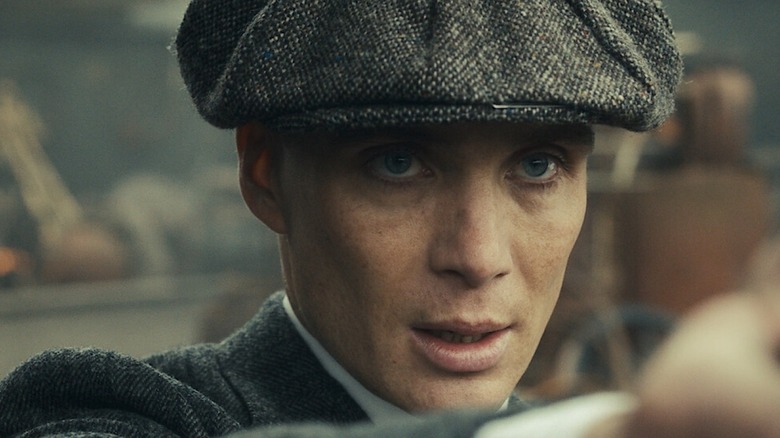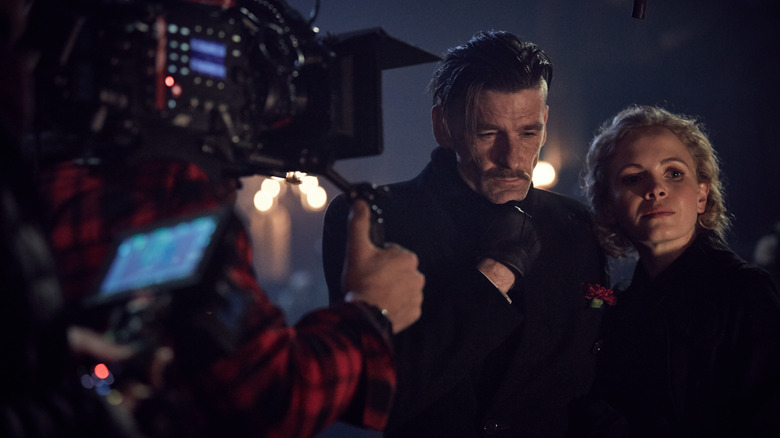Peaky Blinders Got A Letter From A Real War Vet About Tommy Shelby
Look beyond the flashes of cathartic violence, the numerous double-dealing and betrayals (almost all of them involving a certain Alfie Solomons, naturally), and the relentless quest for power featured throughout every season of "Peaky Blinders," and it's plain to see that the entire BBC series boils down to a very simple and straightforward concept. At its heart, the arc of Cillian Murphy's Tommy Shelby is about a man who has been completely unable to come to terms with the trauma inflicted upon him during wartime. Much of the early seasons of the hit show focuses on the crime lord's PTSD-caused flashbacks to his time serving as a tunneler for the British army in World War I. Although he and his regiment saved countless lives, his horrific near-death experiences left him a shell of the man he used to be ... and, in effect, every single one of his actions throughout the series stems from this one event.
For a global phenomenon that requires as much attention to detail as "Peaky Blinders" does (even if certain depictions take some artistic license from historical fact), it should come as no surprise that the same holds true for Tommy's most sensitive personality trait. In an interview with Virgin Media conducted prior to the season 6 premiere, creator Steven Knight revealed just how much effort the creative team put into portraying the Shelby patriarch's awfully traumatized behavior — and the validation they received along the way. As Knight explained:
"I did some research with Jason Statham on a film called 'Hummingbird,' where he played a traumatized veteran from Afghanistan. I spent some time with Royal Marines and other combat veterans who were suffering and learned quite a bit about it, about how it manifests itself."
That said, Knight's preparation differed slightly from his actors.
'It carries on all through someone's life'
Of course, Tommy isn't the only member of the Shelby clan to have entered the conflict of World War I as one person and emerged as someone totally different. His older brother Arthur (Paul Anderson) similarly went through hell and back, carrying lifelong scars that take an immense toll on his behavior, mood, and general mental health in "Peaky Blinders." Between the two, great care had to be taken in order to bring their actions to life as dramatically — and respectfully — as possible. According to Knight:
"The way that Cillian and Paul Anderson portray it is just so instinctive somehow. It's not like, 'Do this, do that, act like this, act like that' — they just sort of get it. It's an important part of the series. What I didn't ever want to do is say, 'OK, series 1 is about post-war trauma, series 2 is about something else.' It carries on all through someone's life."
This ultimately paid off, though not just because of audience feedback about their incredible performances. No, it's fair to say that input from actual veterans with firsthand experience made the biggest difference. Knight goes on to reveal, "A veteran from Afghanistan wrote a letter saying that Tommy's experience spoke to him so profoundly. A few times people have written letters saying, 'This really expresses how I feel,' and that is so valuable."
It goes to show that even the most heightened works of fiction can become unexpected sources of healing and representation. "Peaky Blinders" might be most well-known for hard-to-understand accents and plentiful violence, but instances like this prove there's more than meets the eye. Stay tuned to /Film for updates on the forthcoming movie, as teased by the official "Peaky Blinders" Twitter account.

